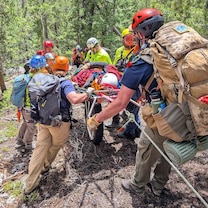In a Sandy Primary, Is There Room for Santorum?
Romney Has the Advantage in Arizona's Feb. 28 Primary
Feb. 14, 2012 -- With two weeks until Arizona's primary, Mitt Romney appears to have nearly every advantage in the state — meaning that if he doesn't win handily, he risks heading into "Super Tuesday" weaker than ever.
There are no primaries or caucuses until Feb. 28, when voters in Arizona and in Michigan will make their picks for the Republican nominee for president. In Arizona, Romney now leads his opponents in polls by a margin of more than 20 points.
But the vote won't be for another 14 days, plenty of time for a surging candidate like Rick Santorum to pick up some ground. Political observers in Arizona see a few key issues that could change the shape of the race, should an underdog candidate harp on them enough to win over voters who have so far settled on Romney.
A candidate looking for an opportunity could adopt a populist tone and seize on voters' lingering distrust of the banking and financial institutions that caused the economic crisis. Arizona's Republican voters are more libertarian than hard-right conservative, in the spirit of Barry Goldwater, said Chuck Coughlin, a GOP strategist in the state.
Coughlin suggested that if Santorum wants to narrow the gap with Romney, he should remind voters of "Romney's Wall Street friends." The GOP primary has already seen a back-and-forth over ties to mortgage giants and financial institutions, though that particular feud involved Romney and Newt Gingrich, who was once the former Massachusetts governor's chief rival.
In late January, Romney accused Gingrich at a Republican debate of "influence peddling" during his time as a Freddie Mac consultant. Gingrich returned fire by drawing attention to stock that Romney owned in the mortgage giant, a line that might stick effectively if it's repeated in Arizona, a state battered by the housing crash.
Santorum has already worn the badge of the populist by repeating his roots as "the grandson of a coal miner who grew up in public housing in a steel town in western Pennsylvania." During a debate in which the candidates were asked if they would release their taxes, Santorum notably said he couldn't because they were on his computer at home, whereas Romney was forced to explain the nature of his income from investments for which he paid a low tax rate.
"If he just plays the standard Republican hand, he's going to lose," Coughlin said of Santorum's chances in Arizona. "Santorum's got to understand that for him to win, he's got to ... create sort of a populist insurgency around his candidacy."
Another key issue is immigration. In southern Arizona, immigration and border control is likely to be a bigger issue than it has been in other states that already have voted in the primary.
So far, the candidates have strayed from specifics. Romney has spoken briefly of a plan that encourages illegal immigrants to "self-deport" themselves; Gingrich has hinted at some sort of guest-worker program; and Santorum has said that every illegal immigrant should leave and apply for legal entry.
Arizona voters are likely to want more details on a policy area that affects the lives of those who live on the border with Mexico. Almost 30 percent of Arizona's population is of Hispanic or Latino origin, nearly double the national rate, according to the census.
The opportunity for candidates to shine is by focusing on changing Mexico, Coughlin said, not just saying "build a fence" or "secure our border."




